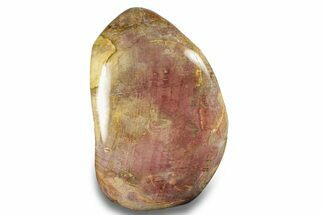This Specimen has been sold.
7.3" Botryoidal Smithsonite Pseudomorph After Calcite - Italy
This is a beautiful specimen of botryoidal smithsonite that formed as a pseudomorph after scalenohedral calcite. It comes out of the San Giovanni mine in Sardinia, Italy, and measures 7.3" wide. The layered smithsonite portions are visible near one edge and along the periphery of the specimen. Empty pockets where the calcite dissolved away can be seen beneath the smithsonite.
It comes with an acrylic display stand.
It comes with an acrylic display stand.
About Smithsonite
Smithsonite forms in earthy botryoidal masses, sometimes forming grape-like structures. It can be found as a secondary mineral in oxidation zones of zinc ore deposits, in some sedimentary deposits, and as an oxidation product of sphalerite. The general chemical formula of smithsonite is ZnCO3, however Fe (iron), Mg (magnesium), Ca (calcium), Cd (cadmium), Cu (copper), and Co (cobalt) can take the place of Zn (zinc). This potential for elemental variation results in smithsonite's wide variety of colors, including blue, green, yellow, orange, pink, purple, brown, gray, white, and colorless.
Smithsonite forms in earthy botryoidal masses, sometimes forming grape-like structures. It can be found as a secondary mineral in oxidation zones of zinc ore deposits, in some sedimentary deposits, and as an oxidation product of sphalerite. The general chemical formula of smithsonite is ZnCO3, however Fe (iron), Mg (magnesium), Ca (calcium), Cd (cadmium), Cu (copper), and Co (cobalt) can take the place of Zn (zinc). This potential for elemental variation results in smithsonite's wide variety of colors, including blue, green, yellow, orange, pink, purple, brown, gray, white, and colorless.
SPECIES
Smithsonite
LOCATION
San Giovanni Mine, Iglesias, South Sardinia Province, Sardinia, Italy
SIZE
7.3 x 4.4"
CATEGORY
ITEM
#211288
 Reviews
Reviews















